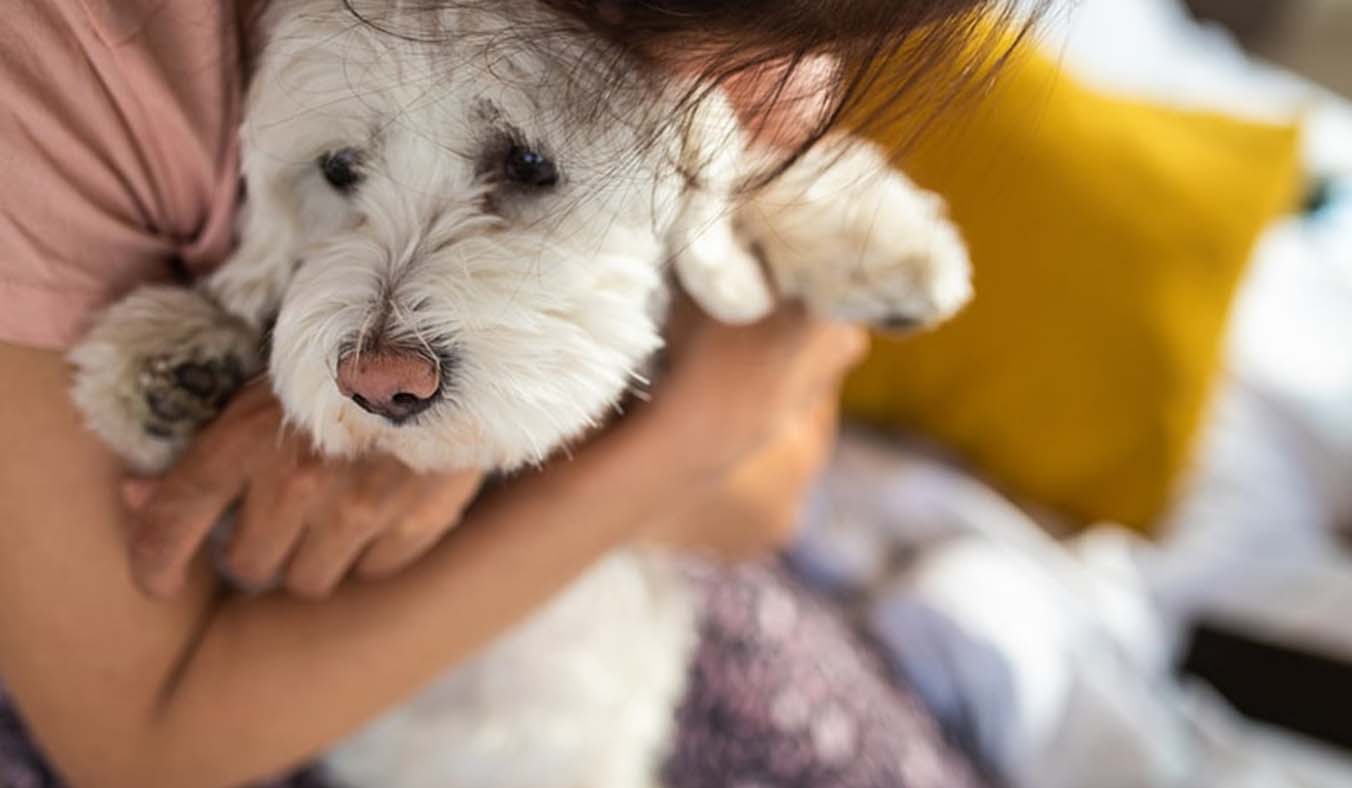Welcoming a new puppy into your home is an exciting and joyous occasion. However, amid the flurry of puppy kisses and wagging tails, it’s essential to recognize the potential impact of stress and anxiety on your young canine companion’s health and well-being. We’ll explore the various health issues that stress can trigger in puppies and effective methods for alleviating stress in dogs.
Health Issues in Stressed Puppies:

Digestive Upsets:
Stress and anxiety can significantly impact a puppy’s digestive health, resulting in a range of gastrointestinal issues that can cause discomfort and affect overall well-being. These include:
- Diarrhea: Stress-induced diarrhea is a common occurrence in puppies and can lead to dehydration and electrolyte imbalances if left untreated. It often presents as loose, watery stools and may be accompanied by urgency and increased frequency of bowel movements.
- Vomiting: Puppies under stress may experience episodes of vomiting, which can range from occasional regurgitation to more severe bouts of projectile vomiting. Vomiting can result in fluid and nutrient loss, leading to further complications if not addressed promptly.
- Appetite Changes: Stress can cause fluctuations in a puppy’s appetite, leading to reduced food intake or even complete loss of appetite. Changes in eating habits can impact nutritional intake and hinder growth and development.
Behavioral Problems:
Stress and anxiety can manifest in various behavioral issues in puppies, reflecting their emotional state and level of distress. Common behavioral problems associated with stress include:
- Excessive Barking: Puppies may resort to excessive barking as a means of expressing anxiety, frustration, or seeking attention. Continuous barking can disrupt household peace and indicate underlying emotional turmoil in the puppy.
- Chewing: Stress-induced chewing behavior is common in puppies and may involve indiscriminate chewing of objects, furniture, or even their own tails. This destructive behavior can result in damage to property and pose a risk to the puppy’s health if they ingest harmful substances.
- Aggression: Puppies experiencing stress may display aggressive behaviors such as growling, snapping, or biting, particularly in response to perceived threats or triggers. Aggression can pose safety concerns for both the puppy and their caregivers and requires careful management and intervention.
Weakened Immune System:
Chronic stress can compromise a puppy’s immune system, leaving them vulnerable to infections and illnesses. A weakened immune response can lead to:
- Increased Susceptibility to Infections: Puppies under stress are more prone to bacterial, viral, and fungal infections, ranging from respiratory infections to skin conditions. Their ability to fight off pathogens may be impaired, resulting in prolonged illness and delayed recovery.
- Slower Healing: Stress-induced immunosuppression can hinder the puppy’s ability to heal from injuries, wounds, or surgical procedures. Delayed wound healing and reduced tissue regeneration can prolong recovery times and increase the risk of complications.
Developmental Delays:
Prolonged stress during puppyhood can disrupt normal development and growth processes, leading to potential long-term health and behavioral consequences:
- Physical Growth: Stress can interfere with the puppy’s growth trajectory, resulting in stunted growth or delayed physical milestones. This may manifest as underweight or undersized puppies with reduced muscle tone and skeletal development.
- Cognitive Functioning: Stress can impact cognitive development and learning ability in puppies, affecting their ability to adapt to new environments, socialize with others, and engage in problem-solving tasks. Developmental delays in cognitive functioning may persist into adulthood and affect the puppy’s overall behavior and temperament.
- Emotional Well-being: Prolonged exposure to stress during critical developmental periods can have lasting effects on the puppy’s emotional well-being, predisposing them to anxiety disorders, phobias, and other behavioral issues later in life.
- Socialization: Stress can hinder the puppy’s ability to socialize and form positive relationships with humans and other animals, leading to fearfulness, aggression, or withdrawal in social situations. Early socialization experiences play a crucial role in shaping the puppy’s behavior and temperament as they mature.
Effective Methods for Reducing Stress in Dogs:

Provide a Safe Environment:
Ensuring your puppy feels safe and secure in their surroundings is paramount for reducing stress. Here’s how you can create a soothing environment:
- Designated Safe Space: Set up a cozy and quiet area in your home where your puppy can retreat to when they need a break. This space should be equipped with a comfortable bed, water bowl, and toys to keep them occupied.
- Minimize Noise and Distractions: Limit exposure to loud noises, such as vacuum cleaners or construction work, which can startle or distress your puppy. Keep their environment calm and predictable to promote relaxation.
- Positive Associations: Associate their safe space with positive experiences by offering treats, praise, and affection when they retreat there voluntarily. This will reinforce the space as a sanctuary where they feel protected and at ease.
Establish Routine:
Dogs thrive on routine and structure, which helps reduce uncertainty and alleviate anxiety. Follow these steps to establish a consistent daily routine for your puppy:
- Feeding Schedule: Stick to a regular feeding schedule, offering meals at the same times each day. Consistency in feeding helps regulate their digestive system and provides a sense of security.
- Exercise Routine: Incorporate daily exercise sessions into your puppy’s routine to burn off excess energy and stimulate their mind. Aim for a mix of physical activities, such as walks, fetch, and interactive games, to keep them engaged and content.
- Bedtime Rituals: Establish calming bedtime rituals, such as a short walk or play session followed by quiet time in their crate or bed. Consistent bedtime routines signal to your puppy that it’s time to unwind and prepare for restful sleep.
Socialization and Training:
Socialization and positive reinforcement training are essential for fostering confidence and resilience in puppies. Follow these guidelines to promote socialization and build trust with your puppy:
- Gradual Exposure: Introduce your puppy to new people, animals, and environments gradually and positively. Start with familiar settings and gradually expand their experiences to prevent overwhelming them.
- Positive Reinforcement: Use rewards, such as treats, praise, and play, to reinforce desired behaviors and build a strong bond with your puppy. Positive reinforcement training methods focus on encouraging good behavior rather than punishing unwanted behavior.
- Consistent Training: Be patient and consistent in your training efforts, setting clear expectations and providing gentle guidance. Use positive reinforcement techniques to teach commands, address behavioral issues, and build confidence in your puppy.
Regular Exercise:
Physical exercise is vital for promoting mental and physical well-being in dogs. Incorporate regular exercise into your puppy’s routine with these strategies:
- Outdoor Activities: Take your puppy for daily walks, runs, or hikes in safe and stimulating outdoor environments. Allow them to explore and sniff their surroundings while providing opportunities for exercise and mental stimulation.
- Playtime: Engage your puppy in interactive play sessions with toys, balls, and games that encourage physical activity and mental engagement. Rotate toys regularly to keep them interested and prevent boredom.
- Training Exercises: Incorporate training exercises, such as obedience training, agility courses, or scent work, into your puppy’s daily routine. These activities provide mental stimulation and help strengthen the bond between you and your puppy.
Bonding and Affection:
Building a strong bond with your puppy through affectionate interactions is crucial for reducing stress and promoting emotional well-being. Here’s how you can foster a deeper connection with your furry friend:
- Quality Time: Spend dedicated one-on-one time with your puppy each day, engaging in activities they enjoy, such as cuddling, grooming, or playing. These bonding moments strengthen your relationship and provide comfort and reassurance to your puppy.
- Physical Affection: Show your affection through gentle petting, belly rubs, and hugs, respecting your puppy’s comfort level and preferences. Physical touch releases feel-good hormones, such as oxytocin, which promote relaxation and reduce stress in dogs.
- Verbal Communication: Use soothing and reassuring tones when interacting with your puppy, offering praise and encouragement to reinforce positive behaviors. Your voice can have a calming effect on your puppy and help alleviate anxiety in stressful situations.
Natural Remedies:
Incorporating natural remedies and calming aids can help soothe your puppy’s nerves and promote relaxation in stressful situations. Consider these options for reducing stress and anxiety in your furry companion:
- Calming Pheromone Diffusers: Use synthetic pheromone diffusers, such as Adaptil, to create a calming environment for your puppy. These diffusers emit pheromones that mimic the calming scent produced by nursing mother dogs, helping to reduce anxiety and promote relaxation.
- Herbal Supplements: Explore natural supplements, such as chamomile, valerian root, or lavender, known for their calming properties in dogs. These herbs can be found in various forms, including treats, tinctures, and sprays, and may help alleviate stress and anxiety in your puppy.
- Soothing Music: Play soft, soothing music or white noise in the background to create a calming ambiance for your puppy. Music therapy has been shown to reduce stress and anxiety in dogs, providing a relaxing atmosphere for rest and relaxation.
- Aromatherapy: Use essential oils, such as lavender or chamomile, diluted in a carrier oil or diffuser to create a calming scent in your puppy’s environment. Aromatherapy can have a calming effect on dogs and help alleviate anxiety in stressful situations. When using natural remedies, always consult with your veterinarian to ensure they are safe and appropriate for your puppy’s individual needs. Your veterinarian can provide guidance on dosage, administration, and potential interactions with other medications.
By incorporating these effective methods for reducing stress in dogs into your puppy’s daily routine, you can create a supportive environment that promotes emotional well-being and helps them thrive. Remember to be patient, understanding, and consistent in your approach, as building trust and confidence takes time and dedication. Your puppy will thank you with wagging tails, wet kisses, and a lifetime of love and companionship.



